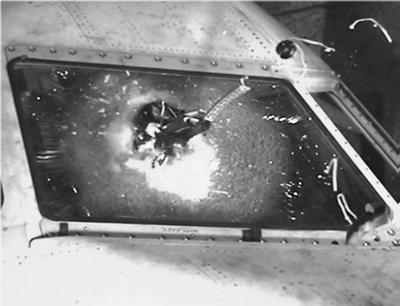Thu, Aug 03, 2017
Drone Industry Says Methodology For Study May Be Suspect
A study co-sponsored by the British Airline Pilots Association (BALPA) and the U.K. government indicates that a 4 kilogram-class (approx. 9 pounds) commercial drone could cause critical damage to an airliner windscreen at high but realistic impact speeds, but many in the drone industry say that the methodology for the study is suspect.

"BALPA believes the results of the tests are a robust verification of the Association’s warnings over several years that drone impacts on aircraft windscreens and helicopter rotors can be catastrophic, even at relatively modest speeds with small drones, and that the industry and regulator cannot rely on birdstrike data and certification for drones," the union said on its website.
The study reportedly used a drone constructed of components for a DJI F450, which was the precursor to the Phantom line. One commenter on the thread, Harvey Mulch, said that the aircraft would have been too heavy to leave the ground under the configuration used in the study, calling the results into question.
DJI also entered into the discussion. Company attorney Brendan Schuman said that if the union was "going to use our name in connection with this thread, kindly send us a copy of the full set of research results.
"Support of a specific drone policy such as registration is an entirely different matter from whether a research methodology is valid and informative."
The U.K. newspaper The Register reports that the research had been highly criticized by the drone industry. Only a brief summary was publicly released, and it does not contain detailed data supporting the conclusions of the report.
The testing was conducted by Quinetiq, a privatized government agency, and many in the drone community say that they produced results that matched what the sponsors wanted to see. The U.K. Department of Transport said that the full results could not be released for reasons of security.
(Image from Facebook)
More News
Klyde Wonders If The 'New' SouthWest Can 'Out-Spirit' Spirit... FMI: www.klydemorris.com>[...]
From 2012 (YouTube Edition): Extensive Expertise in Backup Solutions Makes MCIA Uniquely Qualified In This Market There's no such thing, in aviation, as TOO much caution... hence t>[...]
Aero Linx: Historic Aircraft Association (HAA) The Historic Aircraft Association (HAA) was founded in 1979 with the aim of furthering the safe flying of historic aircraft in the UK>[...]
Jamming Denotes emissions that do not mimic Global Navigation Satellite System (GNSS) signals (e.g., GPS and WAAS), but rather interfere with the civil receiver's ability to acquir>[...]
"Respectfully, U.S. and European airlines should not be even contemplating the future purchase of airplanes from Chinese military companies...” Source: US Representative Raja>[...]
 Klyde Morris (05.02.25)
Klyde Morris (05.02.25) Classic Aero-TV: Introducing The MD302--Mid-Continent's Standby Attitude Module
Classic Aero-TV: Introducing The MD302--Mid-Continent's Standby Attitude Module ANN's Daily Aero-Linx (05.04.25)
ANN's Daily Aero-Linx (05.04.25) ANN's Daily Aero-Term (05.04.25): Jamming
ANN's Daily Aero-Term (05.04.25): Jamming Aero-News: Quote of the Day (05.04.25)
Aero-News: Quote of the Day (05.04.25)



